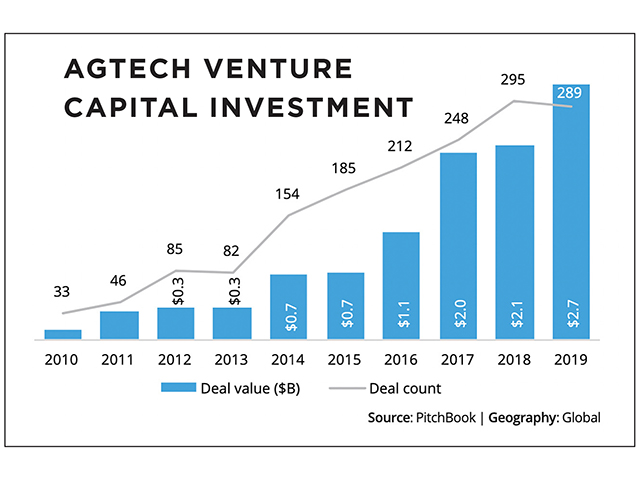We'd Like To Mention
Data and Dollars Digitize Ag
Step into the cab of any of today's lineup of ag equipment, and you'll marvel at the technology displayed on multiple monitors. Digital screens track myriad functions, recording reams of data that, when deciphered, result in smarter decisions to improve your profits and productivity.
This stream of data not only yields invaluable information for your operation but also your trusted partners. By agreeing to share data, your advisers can plot a road map to steer you through an entire growing season. Data guides the decisions, reducing risk and solidifying the odds of success.
The capture and analysis of data will only improve as new technology emerges. Data will drive the future of agriculture throughout the food chain.
Ranveer Chandra, Microsoft Azure Global chief scientist, says we've barely scratched the surface on how data will transform the industry. Speaking at last month's DTN Ag Summit, he predicts field management zones will shrink from acres to inches. Combined with advanced technologies that program planters and applicators to deliver crop input prescriptions of the same accuracy, it will drive down cost efficiencies to new levels.
P[L1] D[0x0] M[300x250] OOP[F] ADUNIT[] T[]
Across the food chain, data has already started to enhance transparency and traceability to satisfy consumers' demands for accountability and assurances for the safety of their food. Data platforms will also verify environmental and sustainability standards being incorporated from farm to fork.
This growing demand for data is one reason investors are betting on agriculture. They're attracted to ag because it's one of the least digitized industries. McKinsey and Co. reported in 2018 that despite technological advances, the ag sector's productivity gains from digitization lag behind.
According to the 2019 AgriFood Tech Investment Review, compiled by Finistere Ventures, a leading California-based agricultural technology and life sciences investor, total capital globally committed to agtech reached $2.7 billion across 289 deals. Digital technologies (imagery, precision agriculture, sensors and farm equipment) made up approximately 41% of total activity in 2019. As the chart above shows, agtech venture capital has seen strong growth over the last 10 years, jumping nearly fourfold since 2014.
"A focus on agtech and foodtech [alternative protein sources, for example] as paths to climate impact mitigation will increasingly become the driver for investment trends that will not only reimagine the future of farming and food, but the future of our planet," says Arama Kukutai, with Finistere Ventures.
Whatever that future eventually becomes, data and related tech will help shape it. Add a lending hand from investors for agriculture to capitalize on the full potential of data.
Over the years, agriculture has witnessed amazing milestones of technological innovation to catapult it to new levels. Norman Borlaug's efforts in Mexico during the 1940s to boost wheat yields, for example, launched the Green Revolution. He laid the groundwork for agricultural technological advances credited for saving a billion people worldwide from starvation and, in the process, earned the Nobel Peace Prize.
The Digital Revolution has the potential to be as significant as Borlaug's work to agriculture and food production. Data-driven farming will make the unpredictable predictable, while connecting you to a data lake of insights to tap into to execute profitable actions on your farm or ranch.
> Write Gregg Hillyer, 2204 Lakeshore Dr., Suite 415, Birmingham, AL 35209, or email gregg.hillyer@dtn.com.
[PF_0121]
(c) Copyright 2021 DTN, LLC. All rights reserved.




